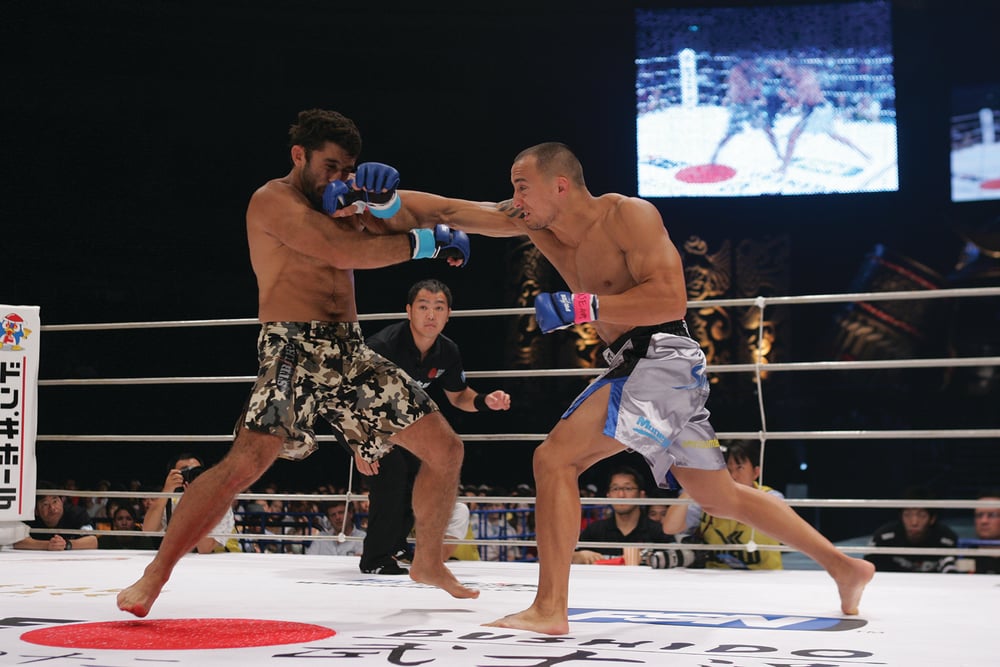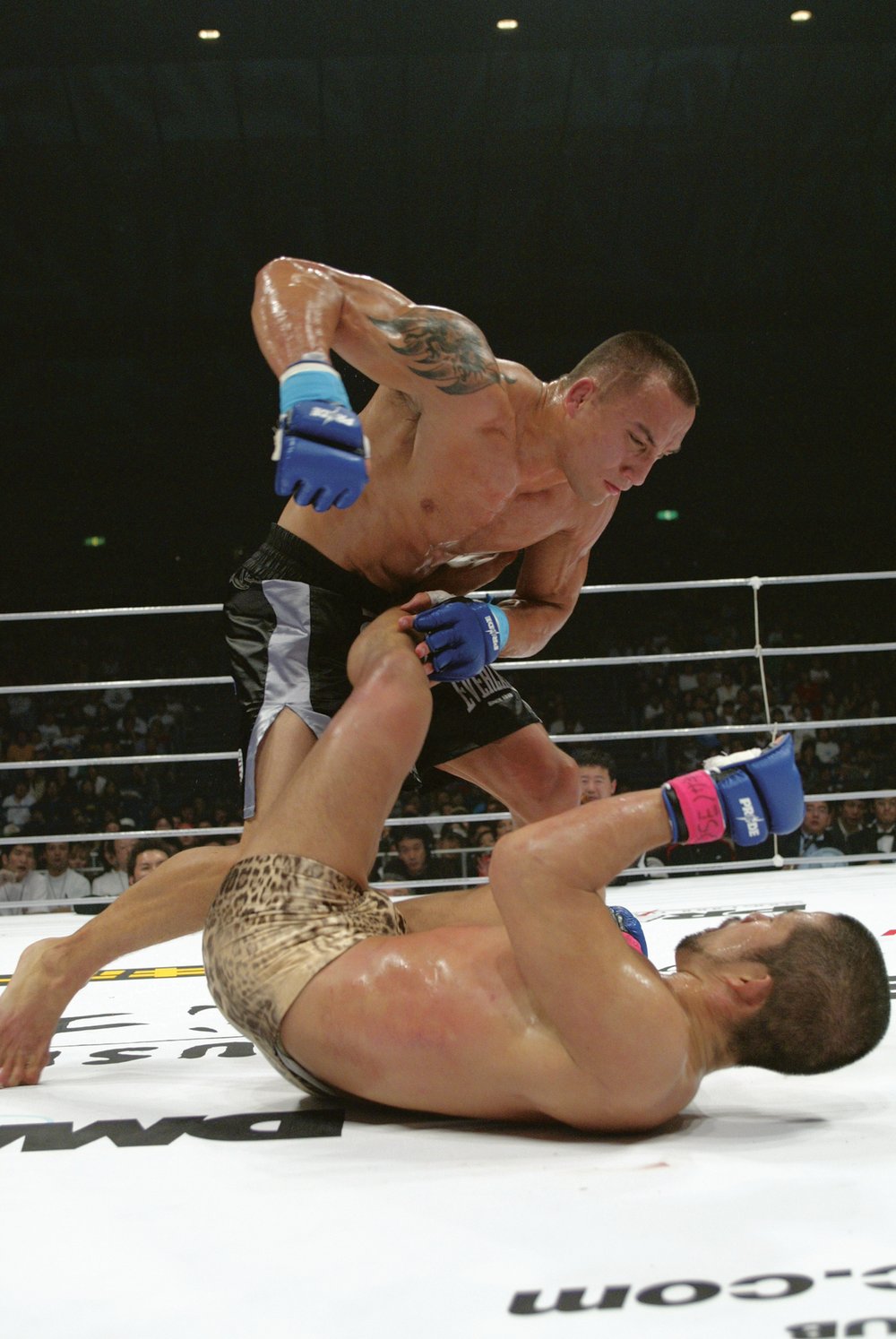
Issue 031
November 2007
With a French mother, a Korean father and a resident of Canada for the majority of his 30 years, Denis Kang has got a very diverse background.
Kang is recognised as one of the most multi-talented fighters in the middleweight division today. In 2003 the nine-year veteran of the sport began one of the longest winning streaks of any current fighter, going 20 consecutive fights without a loss. The run came to an end in the finals of the Pride welterweight Grand Prix last year, a tournament that Denis had literally run through and was hotly tipped to win. Suffering a sever arm injury, he fought on regardless in a display of true heart, losing via decision to the overall tournament winner.
With over 36 mma fights on his record, Denis Kang’s career has been quiet of late, and he has fought only once this year. Instead, the time has been spent in the gym. “I’ve been working a little bit more on my jiu-jitsu and my ground stuff. I think last year, my stand up improved by leaps and bounds and I focussed on that a lot, but of course, if you focus on one thing, there’s going to be another area that suffers – that’s what happened and I thought this year I would take this time to get back to my roots, which is jiu-jitsu.”
The making of a fighter
It’s hard to imagine a better place to hone your ground game than at the American Top Team, based in Coconut Creek, Florida. The training at the plush facility includes a host of experienced Brazilian jiu-jitsu players, to compliment their stable of very talented MMA fighters. “It’s a jiu-jitsu team, it’s jiu-jitsu based, their whole style. There are 15-20 black belts that we have, that I’m training with. Our coach Ricardo Liborio is one of the greatest jiu-jitsu technicians in the world. I don’t have a shortage of ground instruction there, that’s for sure.”
It’s well known that the life journey of a professional fighter is one fraught with problems and difficulties. The demands of training and the financial instability are just two of the more common reasons why pro athletes can sometimes find themselves pulled away from the career they love. For Kang, however, there appears little that can distract him from his path. “Usually when I’m going real hard I train two times a day. It depends on the day. Three times a week I run early in the morning at about 5 o’clock and I run 3km in about 13-14 minutes, so it’s like a sprint. And then go and sleep and then come back and train at the gym at around 12.
“It could be kickboxing sparring, it could be jiu-jitsu sparring or it could be technical work, like pad work and stuff like that. On other days, I’ll start the day at noon and finish it off with weight-lifting or plyometrics at night.”

Entering with enthusiasm into a torturous regime of this kind, picking up and dealing with minor injuries is simply par for the course, as Denis explained. “It’s something that’s part of an athlete’s life – when you’re at this level and you’re training real hard, you’ve got to train no matter what, unless you’re completely debilitated and you can’t walk – then you take time off, but if you have a sore knee, or bad shoulder or back, you’ve got to keep going.
“It’s simply just the proverbial quest to be the best, I really want to excel at my sport, not only that, but I always picture my opponent training harder than I am. That’s a huge, huge motivator right there. It’s just picturing my opponent and him training when I’m not.”
This more cerebral aspect of Kang’s preparations isn’t simply a last-minute add-on, it forms the basis for his ethos of striving to improve and be the very best that he can be. “It’s very important, I do a lot of mental visualisation, visualising positivity and also things like writing down your goals for the week, the year and things like that. Those things are really important.
“Just like they say, when you lose, you’ve got to learn a lesson from it, and when you win, you’ve got to learn from it as well. Not matter how fast, no matter whatever the type of victory, I always go back and analyse it and try to build on that and come back a better fighter than I was in the last fight. I think that’s the key to try and excel in sports is that you can’t just try and get in shape for a fight, you’ve got to not only get in shape, but come back better afterwards.”
Tough times
Growing as an individual and a fighter during his incredible streak of wins, Kang peaked during his appearance in Pride. He seemed set to blast through the biggest test of his career, though it ended in his unfortunate loss against Kazuo Misaki in the Pride welterweight Grand Prix final.
An injury sustained in the first round of the tournament against Akihiro Gono tested his focus to the very limit. “My right bicep was torn, so I had a lot of problems with mobility and strength in that arm. It’s not my preferred way of fighting, that’s for sure. What can you do? That’s what a tournament’s all about, you gotta go on with your injury, there’s no way I was going out.”
What escaped most spectators that night was that there was another, deeper and more troubling factor. Kang’s fiancé, the professional boxer Shelby Walker, had passed away less than six weeks before the tournament in an apparent suicide. Having fought through the deepest of physical and emotional pain, Kang has maintained a dignified silence on the matter.
A return to his roots
One of Denis’ proudest moments so far has been his time fighting in Korea. Fighting in the growing promotion Spirit MC (seen by some of the only possible successor to Pride in Asia) he is their ‘heavyweight’ champion and is happy he can perform in front of a crowd with which he shares such his cultural background. “Because of my Korean heritage they have really taken a liking to me and I’ve really had a chance to get in touch with my roots all over again. My father lives over there, you know, my aunts and uncles – I’ve got a big stake over in Korea and I’m very proud to represent Korea when I fight.”
With his last fight taking place in Korea back in March of this year, things seemed to have gone quiet for the talented middleweight. However, after
this time away from competition, Kang has finally signed a deal with Japanese mega-promotion, K-1 Heroes, a massive boost to his career which allows him to continue to compete for Spirit MC in his beloved spiritual homeland and will keep him fighting in the Far East for the foreseeable future.
Speaking to an mma new outlet recently, he confirmed how important he felt it was for him competing in Korea; “Part of the deal is that I’m still allowed to fight in Spirit MC. Really, it had to be a part of the deal.”
Joyful as he appears about the signing, Kang has to face the fact that, by taking his career to the Far East, he has effectively reduced his chances of taking on the very best fighters in the division,
as - in the view of most pundits - the stiffest competition is currently to be found in the UFC. “It’s no big deal. We did speak to the UFC a little bit and I still would love to fight in the UFC one day, but if now is not the right time, then it’s not the right time.”
Watching out for the World’s best.
However he maintains a close interest in the top fighters in his weight class. “I think definitely Dan Henderson is at number one and I would say Anderson Silva at number two. I think after that it would probably be me and Rich Franklin, maybe Paulo Filho.”
Crushing four straight opponents since his arrival in the UFC, Silva has shown freakish striking abilities and a solid ground game to match – and with a habit of bludgeoning his opponents into the floor, he is a genuinely feared opponent. Kang, however, didn’t have to think twice about the possible match-up, revealing his confidence of being able to overtake the UFC champion and claim the number one spot.
“I think I’ve got a chance of taking him out. I know he’s good. Everyone knows his game is stand up, you know. Someone with my athleticism and control on the ground could definitely take him out, but I wouldn’t be afraid to stand up with him as well.
“The thing about me is that I can do everything, when I fought Amar Suloev, for example, last year, nobody expected me to stand up with him and I think that completely threw him off his game plan and then I was able to take him down nice in the second round.”
His immediate future secured, allowing him to continue a parallel career, one in which he is able to fight in front of hometown fans in Korea, whilst also fighting on centre stage in Japan’s premier show, it won’t be long before the Canadian unleashes the skills that fans admire so much.











